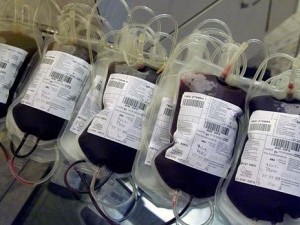Ghana needs 300,000 voluntary donors to meet blood demands – Dr Ofori
 Dr Shirley Owusu Ofori, Acting Chief Executive Officer (CEO), National Blood Service, says Ghana needs 300,000 voluntary blood donors to meet its blood needs.
Dr Shirley Owusu Ofori, Acting Chief Executive Officer (CEO), National Blood Service, says Ghana needs 300,000 voluntary blood donors to meet its blood needs.
This, she said, was in line with World Health Organization (WHO) studies, which indicated that “our blood needs would be covered if 300,000 persons donated blood regularly.”
She was speaking at a special blood donation awareness event hosted in Accra by the Non-Resident Nepali Association Ghana in partnership with the National Blood Service.
Dr Ofori entreated the public, especially those who had never donated to do so noting that “it is a selfless act.”
“I urge members of the public, especially those who have never donated blood before, to realize that doing so willingly is a selfless gesture. One who gives without expecting anything in return while knowing that their act will save the life of a sick patient,” she said.
She informed that every pint of blood donated was crucial since it was a necessary treatment that could not be manufactured.
“Sodium chloride or any other chemical cannot be mixed to produce blood. We are all aware that once a woman goes into labour, she bleeds, no amount of drips or infusions will be able to save her life; thus, the only option is blood,” she said.
According to her, “the main advantage of giving blood is that the donor feels satisfied and has peace of mind knowing that he has helped save a life.”
Other benefits are that the donor will get his health checked and will go home knowing he is healthy and sound, it minimizes a person’s chances of heart attacks, manages weight and checks cells circulation. Voluntary blood donation also helps to regulate and reduce some cancer cell lines.
She praised Mr. Mainali, a renowned global blood donor, and the National Association of Blood Donors Ghana (NABDAG) for their generosity in putting together the initiative to encourage unpaid, voluntary blood donation.
Mr Arjun Prasd Mainali, a well-known international donor and member of the Non-Resident Nepali Association of Ghana, said “he donates blood to help save lives and to inspire others to do the same.”
He said in his journey of donating blood, he had not encountered any negative effect because he eats well, takes lots of fluids that dehydrates the body, exercises and takes proper care of his health.
He said he came to know from the WSO that 600,000 admitted pregnant women in Africa die each year as a result of not receiving blood in a timely manner. This knowledge prompted him to travel to African nations to set up the programme.
Mr Justice Chandza, a donor and student at the Applied Technology Institute, expressed his joy at giving blood and said he was motivated by the idea of saving lives and bringing joy to the recipients.
“I once saw a car accident when the victim lost a lot of blood, and I remember thinking, ‘What if there is no blood for him when he gets to the hospital? Is he going to die or something?'” A second donor, Isaac Neequaye Kotey, quizzed.
He stated that as a result, when he learned that there was a blood donation programme, he did not feel hesitant to donate his blood since he wanted to save a life.
Source: GNA
